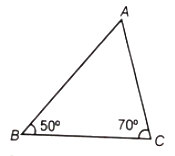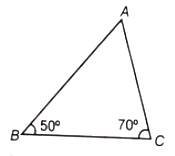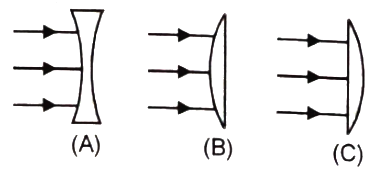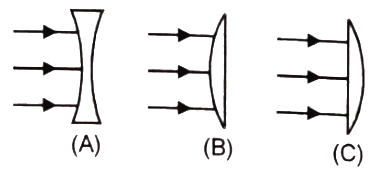If light ray is incident normally on face AB of a part of a prism, then for no emergent ray from second face AC [refractive index of glass of prism]

(1)
(2)
(3)
(4) can have any value
यदि प्रकाश किरण अभिलंबवत रूप से प्रिज्म के एक भाग की सतह AB पर आपतित होती है, तो दूसरी सतह AC से कोई निर्गत किरण न होने के लिए [प्रिज्म के काँच का अपवर्तनांक]

(1)
(2)
(3)
(4) का कोई भी मान हो सकता है


The focal length of a glass lens in air is 20 cm. If it is dipped in water , its focal length in water will be:
| 1. | 80 cm | 2. | 40 cm |
| 3. | 60 cm | 4. | 20 cm |
वायु में काँच लेंस की फोकस दूरी 20 cm है। यदि इसे जल में डुबोया गया है, तब पानी में इसकी फोकस दूरी कितनी होगी?
| 1. | 80 cm | 2. | 40 cm |
| 3. | 60 cm |
4. | 20 cm |
Two point white dots are 1mm apart on a black paper. They are viewed by eye of pupil
diameter 3 mm. Approximately, what is the maximum distance at which dots can be
resolved by the eye ? [Take wavelength of light = 500 nm]
1. 6 m
2. 3 m
3. 5 m
4. 1 m
दो श्वेत बिंदु एक काले कागज पर 1 mm की दूरी पर अलग है। उन्हें 3 mm व्यास की पुतली वाली आंख से देखा जाता है। लगभग, वह अधिकतम दूरी क्या है, जिस पर बिंदुओं को आँख द्वारा विभेदित किया जा सकता है? [प्रकाश की तरंगदैर्ध्य = 500 nm लीजिए]
1. 6 m
2. 3 m
3. 5 m
4. 1 m
For a concave mirror, if the virtual image is formed, the graph between m and u is of the form :
अवतल दर्पण के लिए, यदि आभासी प्रतिबिंब बनता है, तो m और u बीच का आरेख निम्न प्रकार का है:
Absolute refractive indices of glass and water are 3/2 and 4/3. The ratio of velocity of light in glass and water will be
1. 4:3
2. 8:7
3. 8:9
4. 3:4
काँच और जल के परम अपवर्तनांक 3/2 और 4/3 हैं। काँच और जल में प्रकाश के वेग का अनुपात होगा:
1. 4:3
2. 8:7
3. 8:9
4. 3:4
The magnifying power of a telescope is 9. When it is adjusted for parallel rays the distance between the objective and eyepiece is 20cm. The focal length of lenses are
(a) 10cm,10cm
(b) 15cm,5cm
(c) 18cm,2cm
(d) 11cm,9cm
एक दूरबीन की आवर्धन क्षमता 9 है। जब इसे समांतर किरणों के लिए समायोजित किया जाता है तो अभिदृश्यक और नेत्रिका के बीच की दूरी 20 cm है। लेंसों की फोकस दूरी हैं:
(a) 10cm, 10cm
(b) 15cm, 5cm
(c) 18cm, 2cm
(d) 11cm, 9cm
A thin lens of focal length 10 cm is cut into two equal halves and is kept as shown in the figure. If an object O is placed at a distance 10 cm from the optical centre of combination, then the distance of the image from the object will be

(1) 5 cm
(2) 7.5 cm
(3) 10 cm
(4) 20 cm
10 cm फोकस दूरी का एक पतला लेंस दो समान हिस्सों में काटा जाता है और आकृति में दिखाए गए अनुसार रखा गया है। यदि वस्तु O को संयोजन के प्रकाशीय केंद्र से 10 cm की दूरी पर रखा जाता है, तो वस्तु से प्रतिबिंब की दूरी होगी-

(1) 5 cm
(2) 7.5 cm
(3) 10 cm
(4) 20 cm
If four convex lenses, given to you have focal lengths , then which of the following combination will you prefer to form a compound microscope?
(1) as objective and as eye-lens
(2) as objective and as eye-lens
(3) as objective and as eye-lens
(4) as objective and as eye-lens
यदि आपको फोकस दूरी के चार उत्तल लेंस दिए गए हैं तो आप निम्नलिखित में से किस संयोजन से आप यौगिक सूक्ष्मदर्शी बनाना पसंद करेंगे?
(1) अभिदृश्यक के रूप में और नेत्र लेंस के रूप में
(2) अभिदृश्यक के रूप में और नेत्र लेंस के रूप में
(3) अभिदृश्यक के रूप में और नेत्र लेंस के रूप में
(4) अभिदृश्यक के रूप में और नेत्र लेंस के रूप में
Three lenses A, B and C are shown in the figure. Lens A is concave lens. B and C are plano-convex lenses. All the lenses have same focal length f. In which case the spherical; aberration is minimum?

1. A
2. B
3. C
4. All of the above
तीन लेंस A, B और C को चित्र में दिखाया गया है। लेंस A अवतल लेंस है। B और C समतल-उत्तल लेंस हैं। सभी लेंसों की समान फोकस दूरी f है। किस स्थिति में गोलीय विपथन न्यूनतम है?

1. A
2. B
3. C
4. उपरोक्त सभी
The angle of incidence for a ray of light at a refracting surface of a prism is 45°. The angle of prism is 60°. If the ray suffers minimum deviation through the prism, the angle of deviation and refracting index of the material of the prism respectively are
1. 30°,
2. 45°,
3. 30°,
4. 45°,
प्रिज़्म के अपवर्तक पृष्ठ पर आपतित प्रकाश-किरण के लिए आपतन कोण 45° है। प्रिज़्म कोण 60° है। यदि प्रिज़्म के माध्यम में किरण न्यूनतम विचलन दर्शाती है, विचलन कोण और प्रिज़्म के पदार्थ का अपवर्तनांक क्रमशः हैं -
1. 30°,
2. 45°,
3. 30°,
4. 45°,







